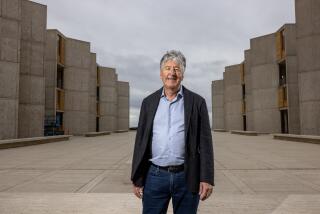Scientist to Establish Gay Student School
- Share via
SAN DIEGO — Simon LeVay, who gained instant fame with his discovery indicating that homosexuality might be caused by anatomical differences in the brain, today goes on leave from the Salk Institute to establish an institute for gay students taught by gay teachers in West Hollywood.
LeVay promises to once again to stir public interest and has already raised eyebrows in the scientific world because he will sharply curtail his own research in neuroscience to found the school.
LeVay’s plans call for the institute, which will be open to everyone, to evolve into a fully accredited university. The school, known as WHIGLE, or the West Hollywood Institute for Gay and Lesbian Education, is scheduled to open Sept. 8, he said.
“We are going to be educating gays and lesbians and helping them to reach more useful, influential positions in society,” said LeVay, a Cambridge University graduate whose brain research last August fueled the nature-versus-nurture debate over whether homosexuality originates in genes or is caused by environment and upbringing.
Gay activists point to colleges that cater to other groups--blacks, women, American Indians--and say the time has come for homosexuals and lesbians to start their own school.
“It will create an unbiased, non-heterosexist environment for students to learn about themselves as well as science and academic issues affecting them,” said Robert Bray, a spokesman for the National Gay and Lesbian Task Force in Washington, D.C. “This doesn’t exist anywhere in the country. It’s unprecedented.”
Starting the school means LeVay--a dedicated scientist for more than two decades--must give up most of his research, taking a leave of absence from Salk. LeVay will trade his technical expertise and the solitude of his lab for the world of fund raising, initially hoping to amass at least $300,000.
On Monday, the West Hollywood City Council is expected to vote on whether to provide a building for the school.
LeVay, 48, jokingly refers to his abrupt career change as a “midlife crisis.” But he believes that he can convert his new-found celebrity into dollars to support the school.
He also took the radical step of telling his main scientific sponsor, the National Institutes of Health, that he would not seek renewed research grants. Instead, he will finish a study now under way that involves imaging the nerves connecting the two hemispheres of the brain.
“I might feel scared about it except there is such enthusiasm in the community,” LeVay said.
The school has already attracted about 40 potential faculty members, including professors from UCLA and USC, according to LeVay. LeVay, who is openly gay, predicts that the school will offer about 50 courses--mostly at night--that might draw about 500 students in its first semester. He plans to teach a course on how the brain governs sexuality.
Some courses will focus on primarily gay issues; others will explore the role of gays in various fields such as literature and art. Still others will resemble the general courses offered at any community college.
“I think it’s a terrific idea,” said Torie Osborn, executive director of the Los Angeles Gay and Lesbian Community Services Center. “The timing is right, the community is so alive, so activated that the mix of academic offerings . . . will meet a real need in the community.”
After LeVay published his startling findings last August, he became a celebrity overnight. Studying cadavers, LeVay found that a segment of the hypothalamus is half as large in homosexual men as it is in heterosexual men. The neurosurgeon theorized that the size might determine sexual preference.
Wooed by talk shows and national magazines, he discussed how he had discovered that the brains of gay men were structurally different from those of heterosexual men.
In the gay community, too, LeVay found that his instant fame had catapulted him to prominence. Suddenly, he was meeting many activists, including Chris Patrouch, an associate transportation planner with the city of West Hollywood. Patrouch hatched the idea for a school and he convinced LeVay that it was “doable,” LeVay recalled.
“We need to unite and come together, developing our culture,” Patrouch said. “Once we’ve done that, we can integrate and become full participants in a transformed society.”
At that point, LeVay said, his school no longer would serve a purpose.
“I wouldn’t mind if eventually our college faded away because there was no need, because gays and lesbians were so accepted in our society.”
Special correspondent G. Bruce Smith contributed to this story.





